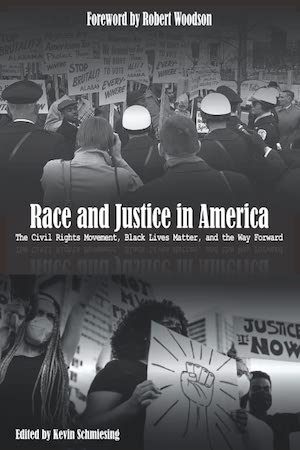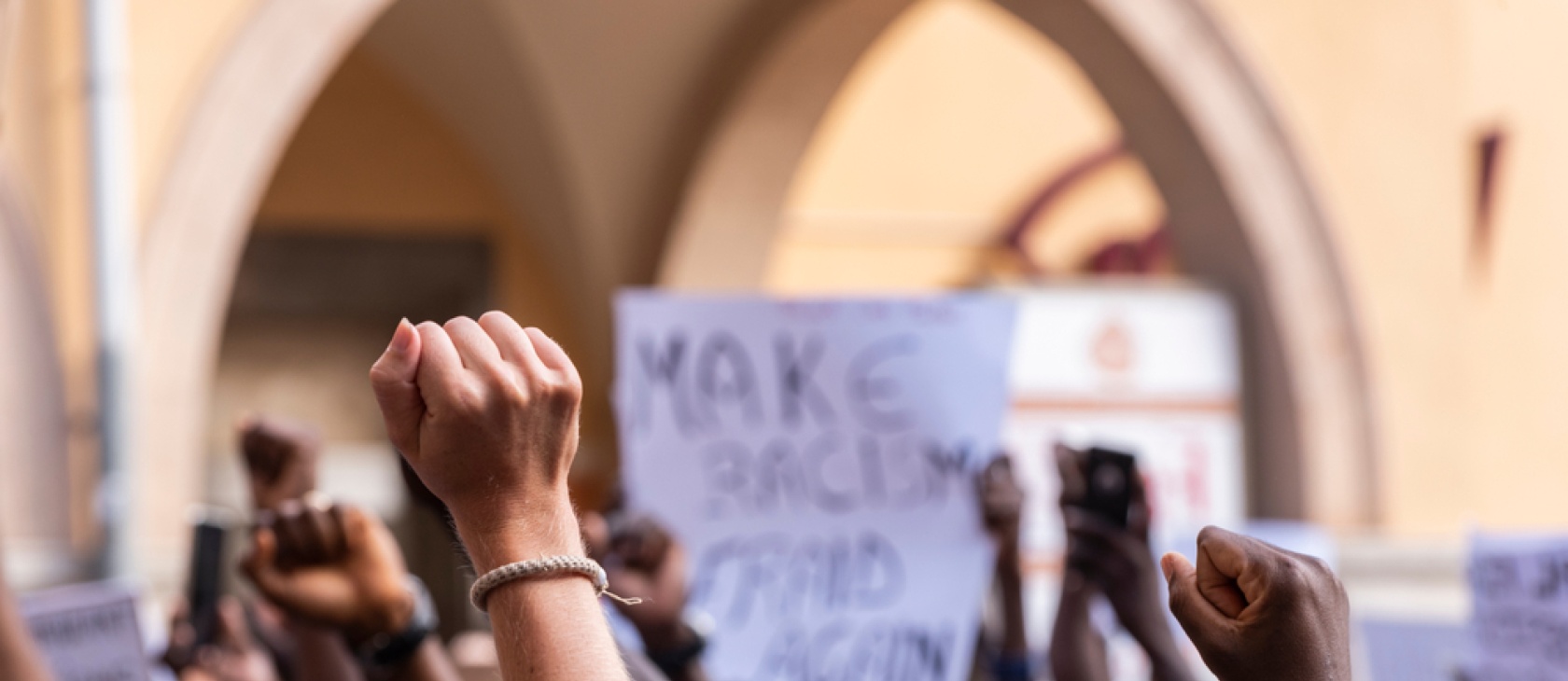In Race and Justice in America, Kevin Schmiesing collects several essays dealing with American race relations from a perspective that affirms the American ideal, grounds it in Christian natural law, and celebrates markets and entrepreneurship. Robert Woodson, a former civil rights activist and conservative who champions black progress through ownership and entrepreneurship, wrote the foreword. It sets the tone for a collection that seems to have been put together to show that conservatives and free marketers can acknowledge America’s racial sins and care about racial uplift without denigrating the American project or becoming socialistic. This is a worthy goal, one I wish more conservatives and classical liberals would attempt. Right-leaning people of goodwill can learn much from the collection. However, the Ismael Hernandez essays, which cover most of the philosophical content of the book, are perhaps too ambitious in their attempt to deal with all the relevant movements and thinkers in such a short space.
State-based and tribal solutions to racial economic imbalances are being challenged from conservative quarters. It’s about time.

The Civil Rights Movement, Black Lives Matter, and the Way Forward
Edited by Kevin Schmiesing
(Freedom & Virtue Institute, 2021)
It’s always a daunting task to simplify complex philosophical debates and historical movements for a popular audience. Schmiesing does an admirable job in the opening essay of providing a quick gloss of the black American struggle for freedom and its relationship with Christianity. The role of faith is undeniable as a matter of historic reality, both among black freedom fighters and their white colleagues. The role of the church in the story is too often obscured by an emphasis on mere politics. While Schmiesing draws on Douglass’ famous condemnation of slave-holding Christianity, the essay would benefit from the addition of a short section on the betrayal of black Christians by white Christians during the civil rights movement itself. For instance, I’m not sure it’s true that the civil rights movement grew into a “nationwide, broadly supported campaign.” It’s more accurate to say that once the legislative goals had been reached through the hard work of a majority black movement with a few brave white activists coming alongside, white America accepted it. Why do I say this? Because in 1968 when he was killed, 75% of Americans disapproved of Martin Luther King Jr., whose philosophy of nonviolence Schmiesing and Hernandez prefer. Billy Graham agreed with King’s goals but argued he was moving too fast, though he later repented for taking this position. Books like God’s Long Summer and The Color of Compromise do an admirable job of telling this theologically, historically, and culturally complex story. Researchers don’t need to agree with these authors about everything to allow their historical insight to inspire some serious soul searching in the white American church. Such acknowledgement is doubly necessary in a work framed as a Christian perspective on race, particularly one also attempting to defend the U.S. Constitution and the American ideal against claims of inherent racist corruption.
Nevertheless, Schmiesing covers a lot of ground here quickly and informatively, demonstrating that the black American struggle has been deeply informed and inspired by the black church and its identification with the Judeo-Christian concept of the human person, the experiences of the Hebrew people in and out of bondage, and the person of Jesus Christ. He acknowledges the undeniable evidence of black oppression in American history and notes well the massive violations of individual liberty.
The core of the book is made up of three essays by black Puerto Rican immigrant and nonprofit leader Ismael Hernandez (one of which is co-authored with Schmiesing). Hernandez wants to present a Christian personalist account of the value of black lives, while critiquing those movements that claim to value them but lack the necessary philosophical grounding on which to do so. This point is clear by the end of the book, at least, though I wouldn’t have minded a more explicit statement of the purposes of the collection up front. I don’t envy him his task either, as leftist political theory is currently composed of a mishmash of academic obscurantism and often deeply conflicting ideas. It’s difficult to engage with it at all without mapping out a maze of interconnected but disparate thinkers, from Hegel, Rousseau, and Marx to Beauvoir, Marcuse, Foucault, and Derrick Bell. In a work like this, it’s not necessary to make every single scholarly distinction apparent, but it can also undermine credibility when too many names and ideas are rolled up into one grand narrative of what’s wrong with our conversations around race. Anyone familiar enough with the content to know all these names and movements will know enough to be nitpicky about the way Hernandez lays them out.
For instance, Hernandez distinguishes broadly between the dialectical/separationist socio-political approach and the personalist/integrationist approach, filing various thinkers and movements under each. But Marxism is clearly dialectical andintegrationist, since it’s an international workers’ movement that seeks to overcome all distinctions other than class. Defining these categories too broadly leads to some odd outcomes, like putting the Nation of Islam (NOI) under the dialectical/separationist label. While the Nation of Islam is certainly a separationist movement, it’s also well-known for its embrace of the traditional family and other bourgeois sensibilities around business success. Socialists condemned NOI leader Louis Farrakhan’s Million Man March because of its emphasis on personal responsibility and black self-help, and you can buy T-shirts online that say “My Conservatism Is Malcolm.” I’m sure experts on other figures Hernandez discusses will bring up similar objections to such broad categorizations.
Why do more precise distinctions matter? For two reasons. First, oversimplification of these categories has a nasty history. You might remember the old picture of a protester against school integration holding up a sign that says “Race Mixing Is Communism.” It’s true that communists supported race mixing, but that doesn’t make race mixing a communist idea any more than the fact that Nazis condemned smoking means that anti-smoking campaigns are eugenicist. We need to be particularly sensitive to this today, as both ends of the political spectrum are equally slapdash in their language, with leftists calling every conservative point racist, and conservatives calling every left-leaning point Marxist. For instance, the Scandinavian system of a robust free market supplemented by a significant welfare state is most decidedly not Marxist. It’s welfare liberalism, and ought to be addressed as such. Oversimplification has led to real confusion. Secondly, we miss out on opportunities for unlikely alliances when we too quickly put other groups into the “wrong” camp. As Frederick Douglass said, “I would unite with anybody to do right, and with nobody to do wrong.” Some of the greatest accomplishments of the conservative movement over the past decade have been in areas with great appeal for black Americans: criminal justice reform and educational freedom. Unduly declaring black cultural heroes like Malcolm X to be the mortal enemies of the movement will undermine good possibilities for civic friendship.
Another point of concern is that readers who aren’t already familiar with these names and philosophical movements will almost certainly feel baffled in trying to follow the conversation, as Hernandez sometimes introduces terminology without immediately defining it and discusses various thinkers with the assumption of background knowledge. He is obviously writing for the educated nonprofessional. The question is, however, how educated? Terms like “personalist,” “realism,” “dialectical,” “collectivist,” and others, combined with a long list of philosophers and activists, can leave one’s head spinning. Ultimately, I found myself wishing that Hernandez would map the philosophical background of this debate with just a few more distinctions between strands of thought, but fewer philosophical figures mentioned to demonstrate them.
Substantively, though, Hernandez hones in on the right principles for thinking deeply about America’s racial tensions: the dignity and inherent value of every individual; our shared human nature regardless of race; and the importance of fighting for freedom and uplift in ways that are effective and not utopian. Hernandez is concerned about revolutionary movements whose utopian fantasies end up making matters worse for marginalized communities by undermining stable social structures and economic chances. He’s absolutely right on that score. For far too long, the academic scene has been populated by thinkers who neither appreciate the absolute Christian claims about the nature of human persons nor the wonders of the free market. It’s frustrating that the greatest source of enrichment for the poor across the world—participation in global markets—is almost universally condemned by the very same people who complain about the relatively impoverished economic position of black Americans. Of course, it might not have gone this way if thinkers more amenable to natural law and free market arguments had been active in defense of property rights, contract rights, and rights to equal protection of the law for black people in this country. That’s why it was heartening to see Schmiesing and Hernandez emphasize both the black church tradition and the white Christian fellow travelers who fought for civil rights; they were among the few who fought for traditional values and black liberation at the same time. But it’s also an opportunity for conservatives and classical liberals to ask themselves why some of their predecessors in the defense of the American ideal weren’t more sensitive to the plight of black America. The simple answer is racism. The bigger question is how that racism was rationalized.
The final essay is perhaps the most inspiring. John Sibley Butler contrasts populations, including a whole class of successful black entrepreneurs, who “took their future to the market” with those who “took their future to the factories.” The main distinction is not whether any of them ever worked in factories, but whether their long-term goal was to stay in the factory system indefinitely or to get their children an education and to open up small businesses. Another major factor at play here is the idea of the group economy, discussed at length by W.E.B. Du Bois in sociological studies of black American life. Butler convincingly argues that those black Americans who perfected the concept of the group economy, started black colleges and universities, and encouraged their children to start small enterprises, created generational wealth. But for those who didn’t, racism plays a devastating role. Millions of people of all colors went to the industrial north for jobs, but the black population suffered worst under unyielding discrimination, far from the long-standing institutions of their southern homes. They simply could not generate the all-black colleges and businesses that those in the south enjoyed and thus stayed on the factory path. Butler discusses the work of William Julius Wilson at length, essentially agreeing with his analysis about the central role of unemployment in black social outcomes but disagreeing with Wilson’s policy recommendations. Parallel to some of Hernandez’s complaints, Butler expresses frustration that the civil rights movement put more emphasis on things like public accommodation law than on building those institutions that would sustain long-term economic growth. This essay is also full of enticing references to work on the tradition of black entrepreneurship in America. I found the historical analysis interesting and the implications for practical solutions compelling.
Finally, Hernandez wraps up Race and Justice in America by condemning the “false dualism” between a conservative movement that merely rolls its eyes at contemporary discussions of racism and a progressive movement that uses our racist past as an “alibi” for every social problem in which the black population is overrepresented. He hopes to carve out a more reasonable approach that does justice to our racist history, doesn’t give in to despair with regard to the American project, and thinks hard about solutions that are actually effective. This is exactly the kind of work that conservatives and classical liberals ought to be doing right now. If we have few if any such accounts of black history on offer, we can hardly complain when the left sucks all the air out of the room. I commend Schmiesing, Hernandez, and Butler for insisting on having this conversation and for refusing to play tribal politics in the process. May this work multiply!




